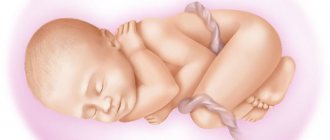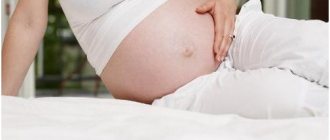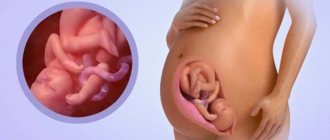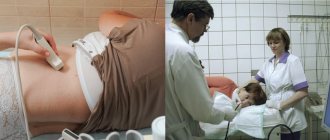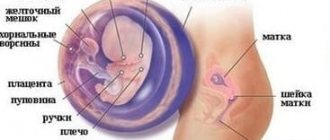Why does the lower back hurt in early pregnancy?
What causes lower back pain in early pregnancy? Most often, women notice increased discomfort in the lower back at 9-11 weeks of pregnancy. At this time, the growing uterus begins to move from its usual place in the lower abdomen into the abdominal cavity.
The ligaments that support the uterus are stretched, which is what causes back pain during pregnancy. This pain is never sharp or paroxysmal. Pregnant women complain of a constant feeling of heaviness , sometimes accompanied by mild nausea.
In the early stages of pregnancy, a woman’s body begins to produce increased progesterone. The discs of the spine change structure, become looser, and slightly change position. This restructuring provokes unpleasant sensations in the back, which can intensify at rest. Typically, pain in the spine ends along with preliminary hormonal changes , after the onset of the 20th week of pregnancy.
Is sex possible in the tenth week of pregnancy?
The question of having sex during pregnancy worries almost every woman, because this is a serious issue. Experts say that it is possible to have sex at 10 weeks, but only if there are no contraindications and there is no threat of miscarriage. Since you are in an unstable emotional state, intimacy is even useful in this case. Since you experience positive emotions, this has a good effect not only on you, but also on the future baby. As they say, if mom feels good, then the baby experiences positive emotions. But it is still recommended to consult a doctor so as not to worry that you can harm your baby.
But if you are still worried about toxicosis at this time, it is recommended to refrain from sex. But if everything is in order, this does not mean that you can do it very often. Also, you should not try new positions, choose the one that is comfortable for you, it is worth remembering that you are still in a position that limits you physically.
Good to know:
Can pregnant women have green tea? Green tea is considered a drink containing a wide variety of microelements: calcium, magnesium, zinc, iron and antioxidants. During pregnancy, it is very imprudent to completely ignore such a drink, since the need to take any beneficial substances increases significantly.
First complementary foods during breastfeeding WHO or the World Health Organization strongly recommends that every nursing mother introduce complementary foods to her baby after six months, and previously limit herself to breastfeeding only. However, each child is individual, and he can either surpass other children in development, or lag a little behind his peers, so you need to focus on the main signs: - the baby sits confidently and turns his head; - the baby is interested in adult food; - weight from birth should increase exactly twice; — the mother gave the baby a spoonful of puree, and he did not spit it out; — at the sight of food, the baby quickly opens its mouth.
The influence of alcohol on conception Nowadays, when the number of women who drink alcohol is very high and is growing every day, the question of conceiving a child becomes quite difficult. Few people, when drinking alcohol, think about how this product affects the unborn child.
Green tea during pregnancyRealizing the fact that in the near future a woman will become a mother, she realizes that she needs to reconsider her life, her habits, lifestyle and nutrition. The safety of the baby’s development and his health will depend on this.
Gallstones during pregnancy The gallbladder is a special organ, one of the main ones in the digestive system. It functions as a storage tank for bile, a special fluid that helps break down fats in the body.
Serious symptoms: when to see a doctor
Despite the fact that all pregnant women can experience mild nagging pain, there are signs that signal serious health problems . The presence of any of them requires an immediate visit to the doctor.
- Pain in the lower back is felt only on one side and is combined with unpleasant sensations in the lower abdomen. These symptoms may indicate a kidney problem that gets worse during pregnancy. Pyelonephritis requires treatment and control, so a visit to a specialist cannot be postponed.
- Sharp pain radiating to the legs and spreading throughout the spine. They may signal an exacerbation of chronic osteochondrosis. Conventional medications cannot be taken during pregnancy; the doctor must suggest a new, safe treatment regimen.
- A sudden attack of pain accompanied by fever and vomiting. The cause can be any acute inflammation - for example, appendicitis.
- Nagging pain in the lower abdomen, dark bloody discharge. An immediate visit to a gynecologist is required to prevent the threat of miscarriage.
- Sharp stabbing pain in the lower back and above. They can talk about myositis - muscle inflammation. The disease is not dangerous to the fetus, but requires treatment under the supervision of a doctor.
In the first trimester of pregnancy, any chronic diseases can worsen .
Women who have suffered a spinal or joint injury, as well as those suffering from congenital or acquired postural defects: lordosis and kyphosis, should also be especially careful.
Body position
If at 12 weeks a pregnant woman begins to suffer from lumbar pain, it is worth paying attention to where she usually sits or lies. Over time, you will have to change your gait.
Listen to the following tips:
- Stand and walk straight, do not increase the load on the intervertebral discs with unhealthy posture;
- Don't stay in the same static position for a long time. Try to turn around, change sides if you are lying down. Don't stand or walk for long periods of time;
- If conditions arise in which you need to stand for a long time, move your body weight from one lower limb to the other every couple of minutes;
- When sitting or lying down, place a thin cushion or pillow under your lower back;
- Do not move abruptly when getting up from lying or sitting positions. Gently lie on your side and squat. And only now get up, better holding on to something;
- Buy a chair with an orthopedic back;
- Don't work at the computer for long periods of time. Both main postures are harmful – sitting and lying down. When you sit at a computer for a long time, you put stress on your lower back. If you lie on your stomach and look at the laptop screen, the cervical spine suffers;
- Don't cross your legs;
- If you have to drive a car, position the mirrors so that you do not need to constantly twist your neck and body while looking at them.
Recommended reading: Why does your back hurt at 38 weeks of pregnancy?
How to deal with lower back pain
To reduce pain , it is necessary to include a set of measures. They will help not only relieve mild nagging pain, but also avoid more serious problems with the spine in late pregnancy and after childbirth.
- Control your weight. In the first months after conception, the body actively stores nutrients for the unborn child, making fat reserves. To avoid gaining weight, it is important to carefully monitor your diet. It is worth removing semi-finished products, smoked meats, and foods high in salt and sugar from the menu. A large amount of fiber, whole grain cereals, fresh and stewed vegetables, low-fat dairy products, lean fish and poultry will help keep your weight under control.
- Watch your drinking regime . Excess fluid can cause swelling, which worsens the condition of the spine. Coffee, strong tea and other drinks that retain water should be excluded.
- Do gymnastics . Intense exercise in the first trimester is contraindicated. Simple exercises on a gymnastic mat, simple yoga asanas, and breathing complexes will help relieve discomfort and strengthen the spine. Low back pain can be relieved by walking at a calm pace. Swimming and aqua aerobics are especially beneficial, removing stress from the back and relaxing the muscles.
- Follow your daily routine . A full eight-hour sleep on a comfortable, not too soft bed is very important. You cannot sleep on armored mesh or feather beds; they do not provide adequate support to the spine. An ideal mattress should be elastic and well-restored. It is worth purchasing a comfortable orthopedic pillow and taking the most comfortable position while sleeping. Avoid stress that can cause pain.
- Move more. A static position at a computer or driving a car causes constant tension in the lower part of the spine, causing pain and discomfort. Every 15 minutes, get up, do a light stretch, or simply change your body position.
- A light massage will help relieve the condition . Rub your lower back with your palms with soft stroking movements. Massage stimulates blood flow and relaxes tense muscles.
- Be sure to wear a prenatal bandage . It provides support to the back, does not hinder movements, and fixes the growing uterus in the correct position. If the doctor has diagnosed back problems (kyphosis or lordosis), the bandage should be purchased at specialized orthopedic salons. Experts will offer a model with an enlarged back part, which will adjust posture and reduce tension in the lumbar region.
- Physiotherapeutic procedures can relieve pain . They are carried out under the supervision of a doctor, the course is prescribed by the attending gynecologist. There are contraindications for physical therapy that must be taken into account.
- Do not prescribe yourself painkillers. In the first months of pregnancy, the body is especially sensitive; incorrectly selected pills can harm the growing fetus. All medications should be prescribed only by the attending physician. This also applies to herbal remedies, as well as all kinds of pain-relieving ointments and compresses.
Pregnancy 11 weeks, stomach hurts: what can you do?
Pregnancy is a wonderful time during which a woman listens to herself. It is worth knowing what to do when your stomach hurts or lower back pain at 11 weeks.
Fetal development at 11 weeks
At the 11th week of pregnancy, the baby moves from the embryonic stage of development to the fruit stage. Now a little man has taken shape in mom’s belly, with a still disproportionately large head, arms longer than his legs, and wide-set eyes. Internal development processes affect the mother’s condition; among other changes, she feels a pull in her lower back at 11 weeks. The child is actively growing, developing and improving muscle function. The face is mobile, the mouth opens and closes, the arms and legs move, the body wriggles, the fists clench.
The baby's ears are formed, the eyes with the emerging iris begin to distinguish between light and darkness. The nose develops the sense of smell. The baby swallows amniotic fluid and releases it as urine. Pregnancy at 11 weeks enters the active phase - the stomach hurts at this stage from time to time and for various reasons.
How does a mother feel at 11 weeks pregnant?
Mom is relieved of morning sickness, but emotions quickly replace each other. This is due to hormonal changes that have not yet ended. It sometimes manifests itself as stomach pain at 11 weeks of pregnancy. Hormonal changes can affect both the weakening of hair and nails and, conversely, their intensive growth and strengthening. Fatigue usually decreases by week 11. In the absence of this dynamics, an analysis of iron content should be done. You may need to increase your hemoglobin.
At week 11, metabolism increases by 25% due to the intensive development of the baby. As a result, the woman feels an increase in temperature and constant thirst. Pure water in unlimited quantities is an essential component of a pregnant woman’s daily diet. If your teeth were not treated before pregnancy, you may have to deal with their crumbling at this stage. The prescribed complex of vitamins and calcium will help avoid problems with gums and teeth.
Since the baby is growing actively, the size of the uterus increases to provide space for an 8 gram fetus with a length of 6.5 cm. The uterus is located in the pelvic part and rises 2-3 cm above the pubic bone. Gradually, the shapes are rounded - that’s why the stomach pulls at the 11th week of pregnancy . Such transformations can manifest themselves in the form of tingling on the sides of the uterus, not necessarily after physical exertion. If such pain at 11 weeks of pregnancy is temporary and goes away, then this is not a cause for concern.
In order not to experience how the stomach pulls, 11 weeks of pregnancy should not be accompanied by a load of more than 3 kg when lifting weights. To prevent the spine from experiencing discomfort, you should maintain correct posture. A straight back and low-heeled shoes will balance the center of gravity. When the 11th week of pregnancy is reached, the lower back often hurts for reasons that will be discussed below.
A condition where the lower back hurts at the 11th week of pregnancy can be avoided by constantly controlled vertical and horizontal movements. All actions must be smooth and slow.
What to do if your stomach or lower back is tight at 11 weeks?
Temporary tingling sensations on the sides of the uterus in the form of mild pain at 11 weeks of pregnancy are not a cause for concern. This is how the walls of the uterus stretch to comfortably accommodate the baby.
An alarming sign will be pulling, grasping pain in the uterus, similar to the experience of menstruation. This condition is a possible threat of miscarriage. When the stomach feels tight at 11 weeks of pregnancy, this signals an increase in the tone of the uterus.
You should not lift any weights if you have pain during the 11th week of pregnancy. You should consult a doctor as soon as possible. Discomfort at the 11th week of pregnancy, when the lower back is pulled, should not go unnoticed by the gynecologist. It happens that at 11 weeks of pregnancy your lower back hurts. The causes of pain when the lower back is pulled at the 11th week of pregnancy include:
- Softening of the ligaments and discs occurs due to the effects of the hormone progesterone.
- Infectious bladder disease during pregnancy.
- A shift in the center of gravity as a result of an enlarged abdomen.
Only a gynecologist can determine why your stomach hurts at 11 weeks of pregnancy. Do not postpone your visit to the antenatal clinic.
| back " |
11TH WEEK OF PREGNANCY, I STARTED TO PULL IN THE BOTTOM OF THE ABDOMEN, AS AS IF I CONSTANTLY WANTED TO pee. WHO HAD THIS?
Girls, tell me what it could be. At 10 weeks I came to register, without the slightest complaint, they looked at me and said that the uterus was in good shape, I needed to go to bed for conservation, they prescribed injections and vitamins. As soon as I went to the hospital, it started, first I started to tingle in the lower abdomen on the sides, now I’m 11 weeks pregnant, I started to pull in the lower abdomen, as if I constantly wanted to pee, and I went to the toilet and still it didn’t go away. And somehow the clitoris seems to be pulling, I constantly want sex, but I can’t. In short, a complete blast. Maybe someone had this.....please tell me!!!
Video about spinal problems during pregnancy
Anyone who wants to learn more about spinal problems during pregnancy should watch the topical video. Professional recommendations from specialists will help relieve pain and understand when you need to see a doctor.
Share your recipes for relieving spinal pain during pregnancy. Perhaps some exercises helped you. Or a prenatal bandage helped solve this problem. What recommendations did your attending physician give you? Your experience will be useful for our readers.
Preparing for pregnancy
First of all, you should make an appointment with an orthopedic doctor. As you already understand, the main cause of pain is the load on the spine. And if this spine has any deviations from the norm, under the influence of this very load they will only appear, adding new colors to your pain palette.
If scoliosis or osteochondrosis is detected, the doctor will most likely recommend swimming. This simple physical exercise perfectly strengthens the spine and muscles, and also additionally prepares your body for childbirth, which helps make it easier.
Another dangerous diagnosis may be flat feet. If you suffer from this disease, then the load on your spine is distributed unevenly, which means that bearing a child, which already overstrains your back, will be very difficult for you.
It would not be a bad idea to visit a nutritionist. During pregnancy, weight rapidly increases, the load on the spinal column increases, and this causes pain. But if even before the start of pregnancy you were overweight, your spine will double in size during pregnancy.
Healthy pregnancy - healthy offspring
Pregnancy 12 weeks and 3 days severe back pain
Hello, I have ostichandosis of the lumbar region, my back used to bother me, but now it’s unbearable pain that radiates from the lower back to the right thigh and under the knee, if I lie down for more than 10 minutes, then I can’t get up, my back shoots, it’s already dark in my eyes, I’m afraid to move at night , the gynecologist referred me to a neuropathologist, he said that there may be a hernia or protrusion, but he can’t help, I can’t take a picture, injections and ointments are also forbidden, all that was recommended was fastum gel, where pregnancy is written in the contraindications, and injections Baralgin for severe pain, I gave the injection once, it didn’t help, I’m in pain and crawling out of bed in the morning, tell me what to do, how to relieve the pain so as not to harm the baby.
Comments on this post
Login Register Only registered users can comment.
Elena Berezovskaya 2014/06/18, #
In such cases, it is possible, and even necessary, to take a photo. You want to be pregnant and not suffer from pain. But a diagnosis of a hernia (and this is a serious diagnosis) cannot be made without an x-ray, and at 12 weeks, when all organs have been formed, x-rays are no longer contraindicated. And the treatment is no longer so scary, even if pregnancy is contraindicated - look at the category of the drug, and if it is B and C, then it’s okay if you take the drug for several days. Pain and your suffering can cause pregnancy loss. So, by suffering, you are already harming yourself more than the medicine.
2016 ClubCom
All rights reserved Help / Technical support / Terms of use Users of ClubCom should be aware of the obvious fact that any advice and recommendations are, first of all, information for thought, but in no case a guide to action.
Sources: No comments yet!
Most women experience lower back pain during pregnancy at various stages. This most often (but not always) occurs in the first trimester (12–13 weeks). Expectant mothers are concerned about how dangerous these pains are, how to cope with them on their own, and how a doctor can help.
All these questions are quite relevant, and the more information a woman has, the more successfully she copes with this scourge, the calmer her pregnancy proceeds. In fact, there is no reason for serious concern, and this phenomenon is caused by completely natural reasons.
Baby development at 10 weeks of pregnancy
At this stage, the fetus moves to a new stage of development - fetal. Now his height is approximately 30 mm, and his weight is 4 g. At the stage of 10 weeks of pregnancy, the organs are all formed and in the remaining periods they will grow and develop. The baby already looks like a little man, his facial muscles are mobile, he can already wince, swallow amniotic fluid with his mouth, his eyelids are drooping. The tissues of the nose and ears are well formed, the rudiments of teeth are beginning to form.
The brain is actively developing, and the cortex and basal ganglia are also forming. The baby's heart beats approximately 150 times per minute. At week 10, the bile ducts and intestines are also formed. The skeleton and joints continue to develop. The immune system is being formed. At this point, the baby can already move, clench and unclench his fists, wave his arms, and may wince.
Discharge
Although, of course, at 11 weeks the risk of pregnancy failure is already much lower than at earlier stages. However, this does not relieve the expectant mother of the responsibility to carefully monitor her health and condition, paying attention, among other things, to the nature of vaginal discharge.
Normally, discharge at the 11th week of pregnancy is of a uniform consistency, mucous, relatively thick, light whitish in color. The “thickness” of the discharge is explained by the influence of progesterone, the “leading” hormone of the first trimester of pregnancy. In the second trimester, estrogen will take a “dominant position”, and the discharge will thin out somewhat. But, both then and now, the discharge should not have any unpleasant odor or change color.
The appearance of yellow, green-gray, purulent discharge, discharge mixed with flakes or foam, curdled, and even having an unpleasant, pungent odor indicates the addition of an infection and the development of one of the infectious genital diseases. As a rule, in case of infection, the discharge is also accompanied by discomfort in the genital tract - itching, burning, and possibly swelling of the genitals. This situation should in no case be ignored: if the pattern of discharge changes, the expectant mother needs to go for an examination to a doctor as soon as possible in order to discuss the possibility of treatment. Otherwise, there is a high risk of transmission of the infection to the fetus in utero and the development of pregnancy complications.
An immediate response is required by the appearance of spotting brown or bloody discharge in a pregnant woman at 11 weeks. Bloody discharge, even in small quantities, but accompanied by abdominal pain, indicates a threat of premature spontaneous termination of pregnancy. In this case, it will not be possible to save the child without specialized help, therefore, even if a woman finds a couple of drops of blood on her panties, it is better for a woman to immediately call an ambulance and, if necessary, agree to be admitted to a hospital.
By the way, spotting may not always indicate a possible miscarriage: it may also bleed due to diseases of the cervix or in the presence of cervical erosion. Usually, spotting in this case is not accompanied by abdominal pain, but appears more often after a gynecological examination or sexual intercourse. Be that as it may, even in this case, an additional examination must be carried out.
Ultrasound
Usually, at 11 weeks of pregnancy, an ultrasound is not yet required. But, in some cases - to confirm the normal course of pregnancy, assess the development of the fetus and exclude possible disturbances in the development of the baby or placenta, to diagnose the condition of the mother in the presence of aching abdominal pain - a woman, by decision of the doctor, may be sent for an unscheduled ultrasound examination.
The expectant mother should not worry - experts assure that ultrasound is an absolutely safe method of examination, and some are even examined using ultrasound much earlier, at 10 or even 9 weeks of pregnancy.
During an ultrasound, the doctor will be able to listen to the fetal heartbeat and, based on the data obtained, draw conclusions about its development. Also, an ultrasound examination will allow the doctor to assess the size and condition of the uterus, determine the place of attachment of the fetus and the location of the placenta, the quantity and quality of amniotic fluid. In general, ultrasound will be another “insurance” method for identifying any pathologies in the baby’s development and deviations in the course of pregnancy in general.
Especially for beremennost.net – Elena Kichak
Pregnant woman special patient
Every doctor will tell you that a pregnant woman is a mystery; everything about her is “different from other people’s”—the pain is different and her complaints are special. This phenomenon is due to her condition, because the work of the entire body of the expectant mother during pregnancy is restructured in order to bear the baby. The hormonal influences necessary for the normal development of the baby also represent a significant burden.
In addition, the woman gains weight, which cannot but affect the functioning of the cardiovascular system. The growing uterus shifts all the organs of the abdominal cavity upward, changing the anatomical relationships.
During this period, a woman is subject to frequent mood swings from euphoria to depression and anxiety, and therefore tends to exaggerate her feelings at times. This factor should also be taken into account when examining pregnant women.
But since two lives are at stake at once, if a pregnant woman has lower back pain, she should be examined and examined most carefully so as not to miss the development of such a formidable complication as gestosis.
